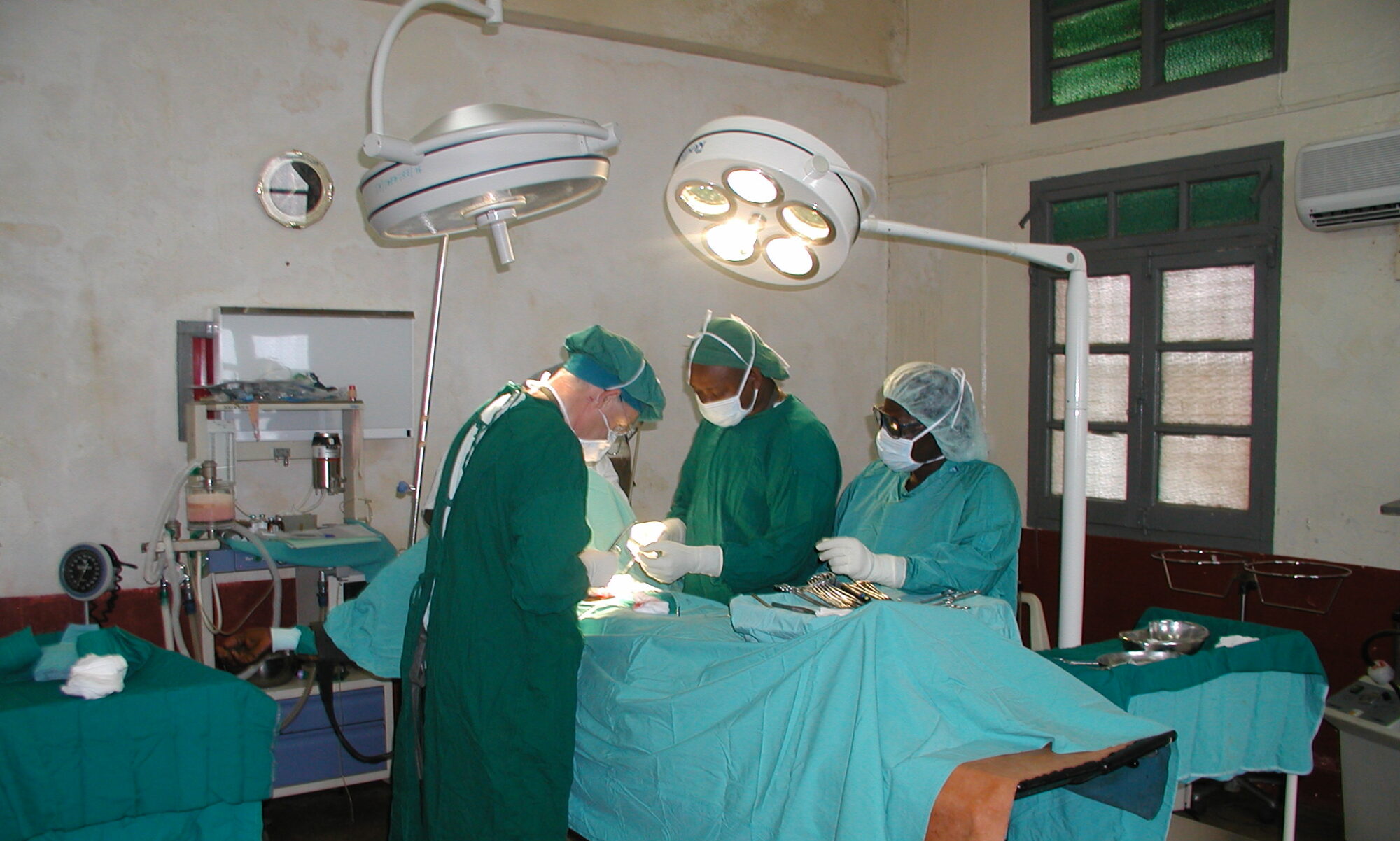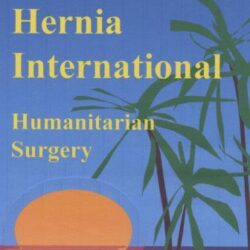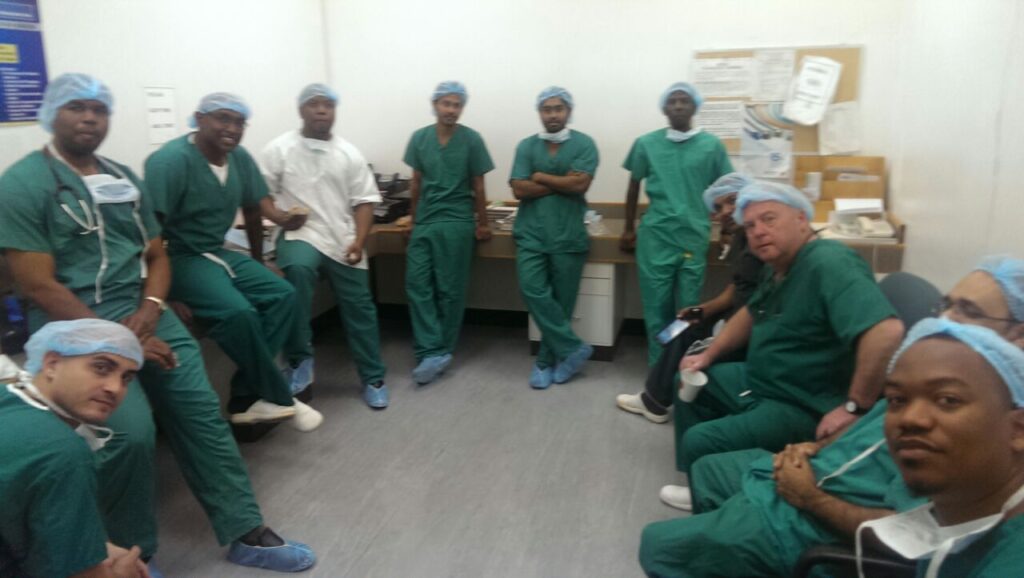
Hernia International visits Trinidad in the West Indies
Whilst at an Intercollegiate Specialty Board Examination in the UK I was asked about groin hernia repairs using mosquito net mesh. The thoughtful surgeon (Prof Vijay Naraynsingh) later asked me to demonstrate its ‘value’ in the West Indies. I was honored and found the invitation hard to turn down! I gathered another volunteer (not too difficult!) but eventually traveled to this friendly region as a single surgeon team.
Trinidad, which lies outside of the Caribbean hurricane belt, is known for its Carnival and is the birthplace of steelpan, limbo, the music styles of calypso and rum (which I was engaged to try on numerous occasions). It is recognized as a high-income economy in the Americas by virtue of its petrochemicals industry. Indeed, I had not realized that many countries around the globe, irrespective of their ‘GDP spending on health’ still had difficulty in persuading patients that groin hernia repairs under local anaesthesia are safe and cost-effective. This was later to prove to be the ‘goal’ of this mission.
After some obligatory paperwork (registration with the Medical Board) I travelled with my wife to be welcomed with open arms but set to work within 36 hours of arrival. At 7am daily I was transported to three different hospitals (Port of Spain General, Mount Hope and San Fernando) on the island, introduced to the patients and asked to choose the most appropriate cases. All the theatres were modern and had temporary AV connections installed so that I could teach the Islands’ audience of medical students, residents and interested surgeons (state employed and in private practice). There was still concern with regards to using EO sterilised mosquito mesh and, as was the case in the first mission of Operation Hernia (2005), I used commercially available mesh. I took my time and explained the steps required of a safe and comfortable repair under a local. None of the hernias were as large as those we see when neglect/delay has taken its toll.
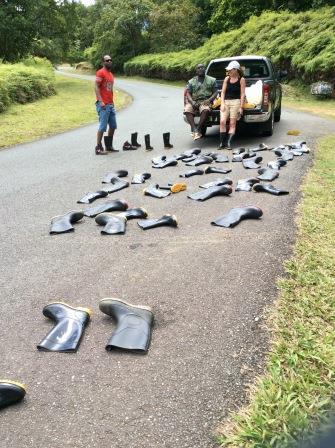
Every night my wife and I were whisked off to various venues to give dinner lectures to an audience of surgical residents and surgeons numbering 40 or so. I spoke about the ethos of Hernia International, Preventing parastomal herniation, Emergency repairs of groin hernias and other topics (7 lectures in total). On the last night I was quizzed by the junior staff on various difficult colorectal problems and realized they too had as many unanswered questions as we do here. After four long days I relaxed on the nearby island of Tobago with my patient wife where we hiked through tropical rain forests.
The Trinidadian medical fraternity proved to be exceptionally welcoming and inquisitive and their patients most grateful (so I have since heard). I hope that I have managed to persuade all concerned as to the value of groin hernia repair under local anaesthesia.
Brian M Stephenson
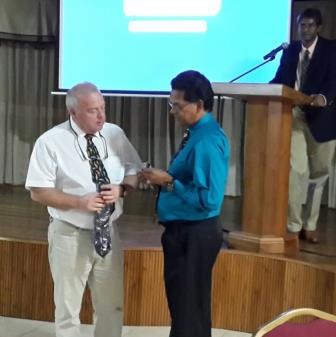
Inguinal Hernia Workshops
23rd – 25th February 2015
This workshop was initiated by Professor Vijay Naraynsingh who met Mr Stephenson at the Royal College of Surgeons examination in September 2014. It was held over three (3) days which comprised of interactive live surgery sessions and a dinner lecture per day.
Mr Brian Stephenson is a Consultant Colorectal Surgeon with special interest in inguinal hernia repair. He is a founding member of the British Hernia Society and has done a considerable amount of work through this affiliation. This includes travel to developing countries where he teaches and proctors the science and art of inguinal hernia repair. The majority of these are done under local anaesthesia.
General Hospital Port of Spain
The University of the West Indies in collaboration with the North West Regional Health Authority (NWRHA) conducted a Workshop in Open Hernia Repair under Local Anaesthesia on February 23. 2015.
Dr Andy Bhagwandass, Chairman of the NWRHA Board, opened the workshop and applauded the efforts of the local organizing team. Dr Bhagwandass affirmed the NWHRA’s support for these educational initiatives. He noted that Trinidad and Tobago was taking a ;ead role to advance surgical practice across the Caribbean.
Professor Vijay Naraynsingh, Head of Surgery at the University, reiterated his intention to strengthen the existing partnership with the NWRHA to ultimately benefit the people of Trinidad and Tobago. The University has undertaken to host two surgical workshops each year at the General Hospital Port of Spain.
Local workshop director, Shamir Cawich, was pleased at the success of the workshop reporting that over fifty (50) surgeons and residents from across the Caribbean participated, including representatives from Grenada and Bahamas.
Mr Brian Stephenson did repair of inguinal hernia under local anaesthesia. Patients were able to return home the same afternoon. The dinner lecture, on hernia repair, was done by Dr Brain Stephenson. It was held at the Tanmak Thai restaurant it was well attended by about fifty (50) doctors.
Eric Williams Medical Sciences Complex: Open Herniorrhaphy Workshop.
This was of great value for us as limited operating time with high trauma and oncological volume has led to a substantial waiting list for inguinal hernias. This workshop, as part of a wider workshop with San Fernando General and Port of Spain General, allowed surgeons in training the opportunity to learn about inguinal hernia repair under local anaesthesia; as a same day/outpatient procedure.
This workshop, coordinated by Dr Ravi Maharaj, Lecturer in Surgery, took place on Tuesday 24th February and commenced with opening remarks from Dr Andy Bhagwandass, Medical Chief of Staff, Mr Kumar Boodram, Chief Executive Officer of the North Central Regional Health Authority and Prof Vijay Naraynsingh, Head of the Department of Clinical Surgical Sciences. Three hernia repairs were performed by UK Visiting Surgeon. All hernias were safely performed under local anaesthesia, the first two (2) with onlay mesh and the third with the plug and patch technique. Case presentations and literature review by the residents during the turn over time as well as thought provoking moderation by fellow consultants made this event a success.
The workshop culminated with a Dinner Lecture at the Radisson’s Hotel, Port of Spain under the sponsorship of the Ministry of Health and patronized by the Honourable Minister Dr Fuad Khan. The feature speaker Mr Stephenson edified the audience on parastomal hernias. Minister Khan brought greeting from the Ministry of Health and encouraged our surgeons to perform these hernias under local anaesthesia.
General Hospital, San Fernando
The third day was hosted by the General Hospital, San Fernando. The live surgeries were well attended by the residents in training and also visiting residents from the Bahamas. The residents had the opportunity to clarify any doubts regarding the relevant anatomy and steps of the procedure. A mesh plug was demonstrated and most significantly the procedures were done under local anaesthesia. The patients did well and were allowed home the same day in minimal pain.
The workshop culminated in a dinner lecture at the Priveé Restaurant. This was well attended by residents and Senior Surgeons from the four main hospitals in Trinidad. The residents presented three challenging cases of colorectal cancer. Each case generated important discussions and allowed Mr. Stephenson to impart more of his knowledge and experience on the subject. The evening was chaired by Mr Patrick Harnarayan FRCS. Professor Naraynsingh presented the University tie and pin to Mr Stephenson as a token of appreciation for his work.
